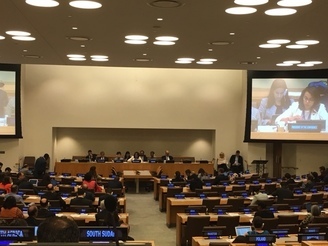Outline of the Treaty on the Prohibition of Nuclear Weapons (TPNW)
Against the backdrop of globally increasing awareness of the inhumanity of nuclear weapons and the stagnation of nuclear disarmament, on July 7, 2017, the Treaty on the Prohibition of Nuclear Weapons (TPNW) was adopted by 122 countries, which accounts for over 60 percent of UN member states. These countries demonstrated their unequivocal determination to achieve nuclear abolition. In December of the same year, the International Campaign to Abolish Nuclear Weapons (ICAN) was awarded the Nobel Peace Prize for its contribution to the successful adoption of the treaty.
The treaty opened for signature on September 20, 2017, and on October 24, 2020, the number of nations ratifying the treaty reached 50. The Treaty on the Prohibition of Nuclear Weapons entered into force on January 22, 2021.

Main Points of the TPNW
Referring to Hibakusha (Preamble)
The treaty refers to the suffering and harm caused to the hibakusha as well as the efforts made towards nuclear abolition through furthering the principles of humanity undertaken by the hibakusha, among others.
Prohibiting such activities as developing, testing, using or threatening to use nuclear weapons (Article 1)
The treaty prohibits under any circumstances such activities as developing, testing, manufacturing, acquiring, possessing, stockpiling, transferring, using or threatening to use nuclear weapons.
Stipulating measures for nuclear-weapon states to join the treaty (Article 4)
The treaty stipulates that nuclear-weapon states can become its signatories based on the premise that they shall complete their commitment to eliminate nuclear weapons by a set deadline with verification conducted by a competent international authority.
Holding meetings to discuss the treaty (Article 8)
The treaty institutes the holding of meetings of States Parties as well as review conferences to discuss its operation, to both of which non-states parties and NGOs, among others, shall be invited.
Current situation
The First Meeting of States Parties to the Treaty on the Prohibition of Nuclear Weapons was held in Vienna, Austria, from June 21 to 23, 2022. The meeting reaffirmed the inhumanity of nuclear weapons and adopted the final document, Vienna Declaration that criticizes security systems relying on nuclear weapons and outlines measures to realize the objectives of the treaty, such as facilitating participation and providing victim assistance. The meeting also adopted the Vienna Action Plan, which specifies concrete procedures and actions to implement the treaty.
What challenges do we face now?
Measures for time-bound and irreversible elimination of nuclear-weapon programs will be decided at the meeting of States Parties. Moving forward, the participation of nuclear-weapon and nuclear-umbrella states is crucial in exploring the specifics of these measures. The challenge is how to facilitate universal ratification through this treaty becoming widespread and making it an impetus for nuclear abolition. The City of Hiroshima will continue to work with Mayors for Peace towards this goal.
Support our petition drive!
In order to achieve a world without nuclear weapons, it is essential that the nuclear-weapon and nuclear-umbrella states participate in the discussions concerning the treaty’s effective implementation, and attend the meeting of States Parties. Furthermore, we must urge all states to sign and ratify the treaty to enhance its effectiveness. Mayors for Peace, an international organization led by the City of Hiroshima, is pushing a petition drive calling on all states to ratify the treaty. Petition forms are available at ward offices, as well as on the Mayors for Peace website.
Let the world hear our appeal for peace and urge all states to participate in the treaty through this petition drive!
- You can also download the fliers describing the contents of this page here
Inquiries about this page
Peace Promotion Division
International Peace Promotion Department
Tel: 082-504-2898 / Fax:082-504-2986
Mail: [email protected]
PDFファイルをご覧いただくには、「Adobe(R) Reader(R)」が必要です。お持ちでない方はアドビシステムズ社のサイト(新しいウィンドウ)からダウンロード(無料)してください。
